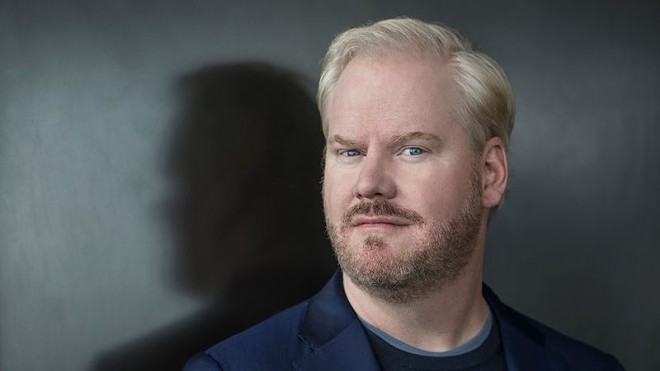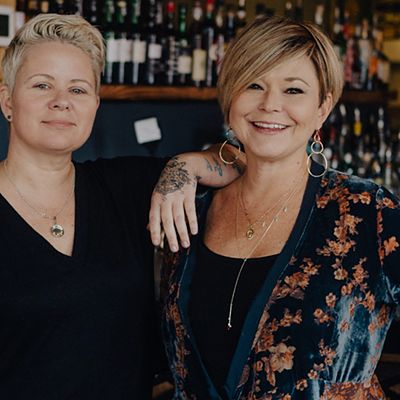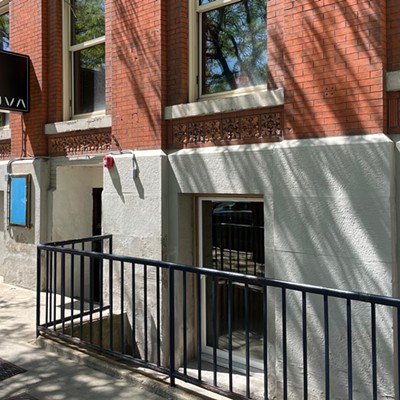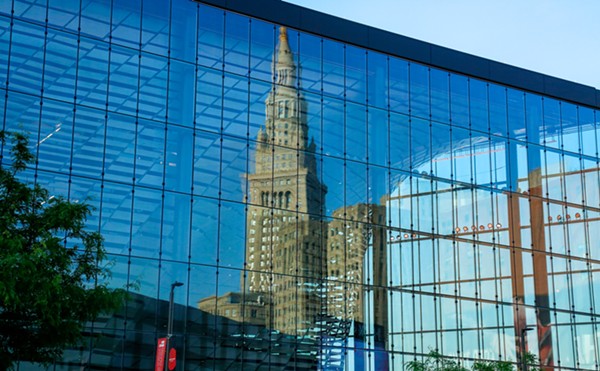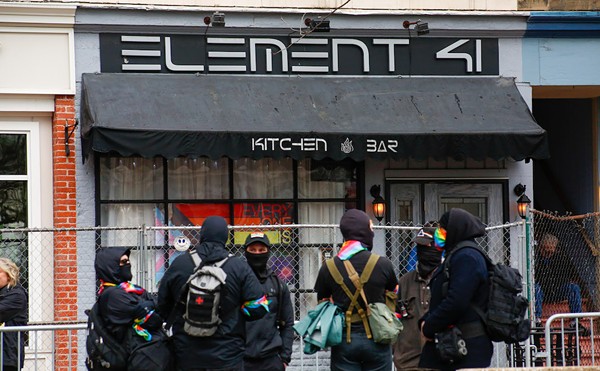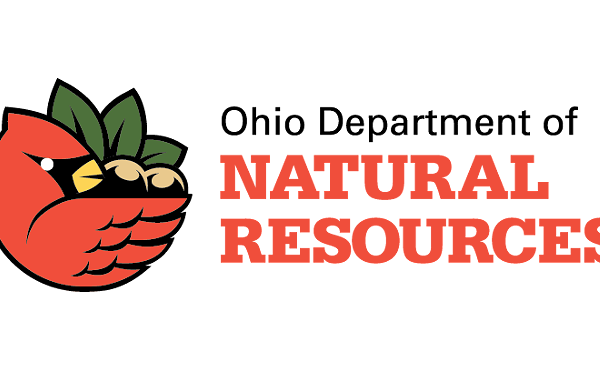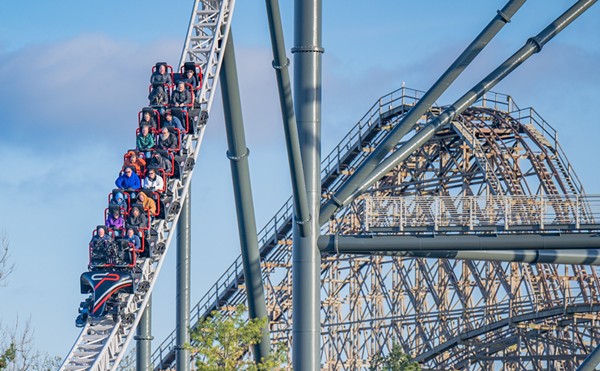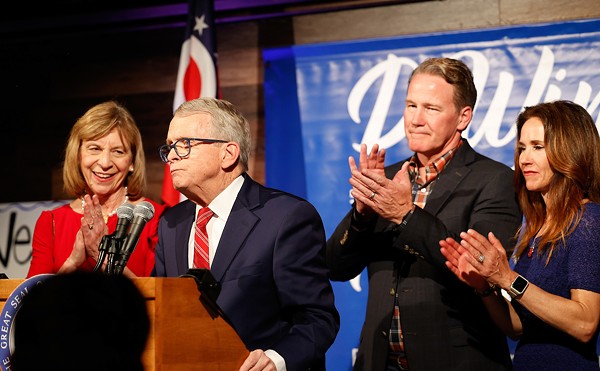Comedian Jim Gaffigan Explains the Concept Behind his Noble Ape Tour
By Jeff Niesel on Tue, Nov 21, 2017 at 12:13 pm
[
{
"name": "Ad - NativeInline - Injected",
"component": "38482495",
"insertPoint": "3",
"requiredCountToDisplay": "5"
},{
"name": "Real 1 Player (r2) - Inline",
"component": "38482494",
"insertPoint": "2/3",
"requiredCountToDisplay": "9"
}
]
Earlier this year, Jim Gaffigan, one of the world’s highest grossing stand-up comedians, embarked on his Noble Ape international arena and theater comedy tour. While on the tour, he's performed in China, Japan, England, Canada, Paris, Denmark, Sweden, Norway, Finland and Iceland.
He brings the tour to Wolstein Center at 8 p.m. on Friday, Dec. 1.
The slow-talking clean comic also stars opposite Jason Clarke, Kate Mara and Ed Helms in the forthcoming film Chappaquiddick, the story of the infamous event that killed Ted Kennedy’s chance at becoming president. Other upcoming films include Drunk Parents, a film starring Alec Baldwin, Salma Hayek, and Duck Duck Goose, an animated movie that also features the voices of Carl Reiner and Stephen Fry.
In a recent phone interview, Gaffigan talks about the concept for the current tour, which he says features a good amount of new material.
Your current tour is called the Noble Ape Tour. Explain the concept.
It’s interesting. I’ve tried to come up with names for specials and tours over the years. I like Noble Ape. Some of the names, I look back and don’t like them. It’s like trying to capture the fact that I consider myself someone who is a bit of an animal. That’s the “noble ape” of it all.
Is it like the Noble Savage?
Yeah. It’s very much that we’re consciously trying to not behave like an ape. Really, we’re all just a bunch of animals that have some higher thinking.
You’ve done multiple dates in some cities. Do you alter your sets for those shows?
No. It’s interesting. Other people have asked about that. Some of it is availability. I mix it up some. The last time I was in Cleveland, I did this larger theater. Now, we’re going to do this one at the Wolstein Center. It’s weird. I never thought I would do theaters. Doing an arena seems absurd. That being said, I’ve done arenas and some of them are super nice and technology has caught up so it’s a quality experience for the audience. You don’t look at Twitter afterward and read things like “I couldn’t see him or hear him.” Some of the arenas are better than mid-sized theaters. It’s pretty amazing. I noticed that when I did Madison Square Garden. As a comedian, standup is such an intimate conversation you’re having with someone. You don’t want to lose that at all.
I like the commentary you did on your recent album Cinco as much as the jokes. Talk about what it was like to discuss your creative process in that manner?
The business is ever-changing. My wife and I do everything together. My friend was releasing the album and he wanted bonus material. I had something about my father from a long time ago. Jeannie and I write together, and I thought collaboration behind it would be interesting. I wanted to capture some of the jokes that were removed and some that had to be removed. It was kind of fun.
Talk about your role in Chappaquiddick, the film about the event that ruined Ted Kennedy’s chance at becoming president.
It was amazing. It’s this historical event. I’m this Irish Catholic from the Midwest. Growing up, the Kennedys were so huge. They were such a huge thing in America too. In this day and age with the absence of accountability and entitlement for us to look at what the Kennedys got away with. Today, since this woman died, Ted Kennedy would definitely have gone to jail.
Did you know much about the incident before you read the script?
I was very much aware of it, and I knew they were trying to make this movie for 25 years — not this specific version but a movie about the event. I was offered the role, and I thought to play a Boston guy from the ’60s would be fascinating.
What was it like to play a serious role?
It was great. I think it’s funner. There’s not this pressure to entertain. You can be caught up in doing what is best for the story.
Standup comedy involves some sort of acting, but how difficult was it for you when you first started to act.
It was something I had always kind of done. You don’t have control over what you’re known for. I always acted, and I always did standup. I had done some sitcom stuff. When it aired on Comedy Central, my Beyond the Pale special transformed my career.
What’s it been like to play Colonel Sanders in the KFC commercials?
That was just silly. I had sworn off doing commercials and then I was offered the Chrysler campaign and I could do it with my wife and kids and I did that. Trying to be considered as a real actor, I didn’t want to do another goofy commercial. I love Norm Macdonald and I love Darrell Hammond and what they had done with Colonel Sanders. I was the third one asked. I thought if Norm and Darrell and I had done it, I could do it. I was from Indiana, and that neighbors Kentucky, so I was happy to do it.
What first inspired you to include jokes about food in your routines?
It’s so amazing because it was my attempt to find stuff that would appeal to everyone in the room and I was trying to find my voice. I knew if I brought a food item, everyone would know what I was talking about and I could have a strong opinion about it and it wouldn’t piss anyone off. Many of my good friends are these outlandish comedians, but I’m not trying to shock people or say the most outlandish things. I just want to make people laugh.
What was your first food joke?
I don’t know what the first one would be. I ended up doing a book on food. And the new hour is mostly not food. Even my last special when I was live on Netflix, for the first 45 minutes, there was no food. I don’t have control over what people think about me. I’m sure some people think of me as the food guy, and the Hot Pockets stuff did change everything.
You originally thought the Hot Pockets commercial you saw was an SNL skit, right?
Yes. I was like, “This is just absurd.”
You regularly critique yourself during your routines, saying what you think a disparaging audience member might think. Talk about when that habit first developed.
That really came down to when I was starting in the ’90s in New York City. I am a slow talking Midwesterner. Before YouTube and Comedy Central and satellite radio hit its stride, audiences didn’t know how to respond to standup. Some people might see it on The Tonight Show but generally they weren’t that familiar with it. When I did the shows, I often had to perform late at night. If I stopped talking, sometimes audience members would talk. It was a way of disarming them before they said anything.
You’re currently one of the world’s most popular comics at the moment. What is that like?
It’s amazing. I really love doing standup, and it’s something where it doesn’t feel like work. It’s something I really enjoy. There’s a lot of hard work that goes into writing material and rewriting it and making sure it works but it’s not something I dislike. It’s something I feel like I’m always getting better at too.
He brings the tour to Wolstein Center at 8 p.m. on Friday, Dec. 1.
The slow-talking clean comic also stars opposite Jason Clarke, Kate Mara and Ed Helms in the forthcoming film Chappaquiddick, the story of the infamous event that killed Ted Kennedy’s chance at becoming president. Other upcoming films include Drunk Parents, a film starring Alec Baldwin, Salma Hayek, and Duck Duck Goose, an animated movie that also features the voices of Carl Reiner and Stephen Fry.
In a recent phone interview, Gaffigan talks about the concept for the current tour, which he says features a good amount of new material.
Your current tour is called the Noble Ape Tour. Explain the concept.
It’s interesting. I’ve tried to come up with names for specials and tours over the years. I like Noble Ape. Some of the names, I look back and don’t like them. It’s like trying to capture the fact that I consider myself someone who is a bit of an animal. That’s the “noble ape” of it all.
Is it like the Noble Savage?
Yeah. It’s very much that we’re consciously trying to not behave like an ape. Really, we’re all just a bunch of animals that have some higher thinking.
You’ve done multiple dates in some cities. Do you alter your sets for those shows?
No. It’s interesting. Other people have asked about that. Some of it is availability. I mix it up some. The last time I was in Cleveland, I did this larger theater. Now, we’re going to do this one at the Wolstein Center. It’s weird. I never thought I would do theaters. Doing an arena seems absurd. That being said, I’ve done arenas and some of them are super nice and technology has caught up so it’s a quality experience for the audience. You don’t look at Twitter afterward and read things like “I couldn’t see him or hear him.” Some of the arenas are better than mid-sized theaters. It’s pretty amazing. I noticed that when I did Madison Square Garden. As a comedian, standup is such an intimate conversation you’re having with someone. You don’t want to lose that at all.
I like the commentary you did on your recent album Cinco as much as the jokes. Talk about what it was like to discuss your creative process in that manner?
The business is ever-changing. My wife and I do everything together. My friend was releasing the album and he wanted bonus material. I had something about my father from a long time ago. Jeannie and I write together, and I thought collaboration behind it would be interesting. I wanted to capture some of the jokes that were removed and some that had to be removed. It was kind of fun.
Talk about your role in Chappaquiddick, the film about the event that ruined Ted Kennedy’s chance at becoming president.
It was amazing. It’s this historical event. I’m this Irish Catholic from the Midwest. Growing up, the Kennedys were so huge. They were such a huge thing in America too. In this day and age with the absence of accountability and entitlement for us to look at what the Kennedys got away with. Today, since this woman died, Ted Kennedy would definitely have gone to jail.
Did you know much about the incident before you read the script?
I was very much aware of it, and I knew they were trying to make this movie for 25 years — not this specific version but a movie about the event. I was offered the role, and I thought to play a Boston guy from the ’60s would be fascinating.
What was it like to play a serious role?
It was great. I think it’s funner. There’s not this pressure to entertain. You can be caught up in doing what is best for the story.
Standup comedy involves some sort of acting, but how difficult was it for you when you first started to act.
It was something I had always kind of done. You don’t have control over what you’re known for. I always acted, and I always did standup. I had done some sitcom stuff. When it aired on Comedy Central, my Beyond the Pale special transformed my career.
What’s it been like to play Colonel Sanders in the KFC commercials?
That was just silly. I had sworn off doing commercials and then I was offered the Chrysler campaign and I could do it with my wife and kids and I did that. Trying to be considered as a real actor, I didn’t want to do another goofy commercial. I love Norm Macdonald and I love Darrell Hammond and what they had done with Colonel Sanders. I was the third one asked. I thought if Norm and Darrell and I had done it, I could do it. I was from Indiana, and that neighbors Kentucky, so I was happy to do it.
What first inspired you to include jokes about food in your routines?
It’s so amazing because it was my attempt to find stuff that would appeal to everyone in the room and I was trying to find my voice. I knew if I brought a food item, everyone would know what I was talking about and I could have a strong opinion about it and it wouldn’t piss anyone off. Many of my good friends are these outlandish comedians, but I’m not trying to shock people or say the most outlandish things. I just want to make people laugh.
What was your first food joke?
I don’t know what the first one would be. I ended up doing a book on food. And the new hour is mostly not food. Even my last special when I was live on Netflix, for the first 45 minutes, there was no food. I don’t have control over what people think about me. I’m sure some people think of me as the food guy, and the Hot Pockets stuff did change everything.
You originally thought the Hot Pockets commercial you saw was an SNL skit, right?
Yes. I was like, “This is just absurd.”
You regularly critique yourself during your routines, saying what you think a disparaging audience member might think. Talk about when that habit first developed.
That really came down to when I was starting in the ’90s in New York City. I am a slow talking Midwesterner. Before YouTube and Comedy Central and satellite radio hit its stride, audiences didn’t know how to respond to standup. Some people might see it on The Tonight Show but generally they weren’t that familiar with it. When I did the shows, I often had to perform late at night. If I stopped talking, sometimes audience members would talk. It was a way of disarming them before they said anything.
You’re currently one of the world’s most popular comics at the moment. What is that like?
It’s amazing. I really love doing standup, and it’s something where it doesn’t feel like work. It’s something I really enjoy. There’s a lot of hard work that goes into writing material and rewriting it and making sure it works but it’s not something I dislike. It’s something I feel like I’m always getting better at too.
SCENE Supporters make it possible to tell the Cleveland stories you won’t find elsewhere.
Become a supporter today.
About The Author
Jeff Niesel
Jeff has been covering the Cleveland music scene for more than 20 years now. And on a regular basis, he tries to talk to whatever big acts are coming through town, too. If you're in a band that he needs to hear, email him at [email protected].
Scroll to read more Cleveland News articles
Newsletters
Join Cleveland Scene Newsletters
Subscribe now to get the latest news delivered right to your inbox.

